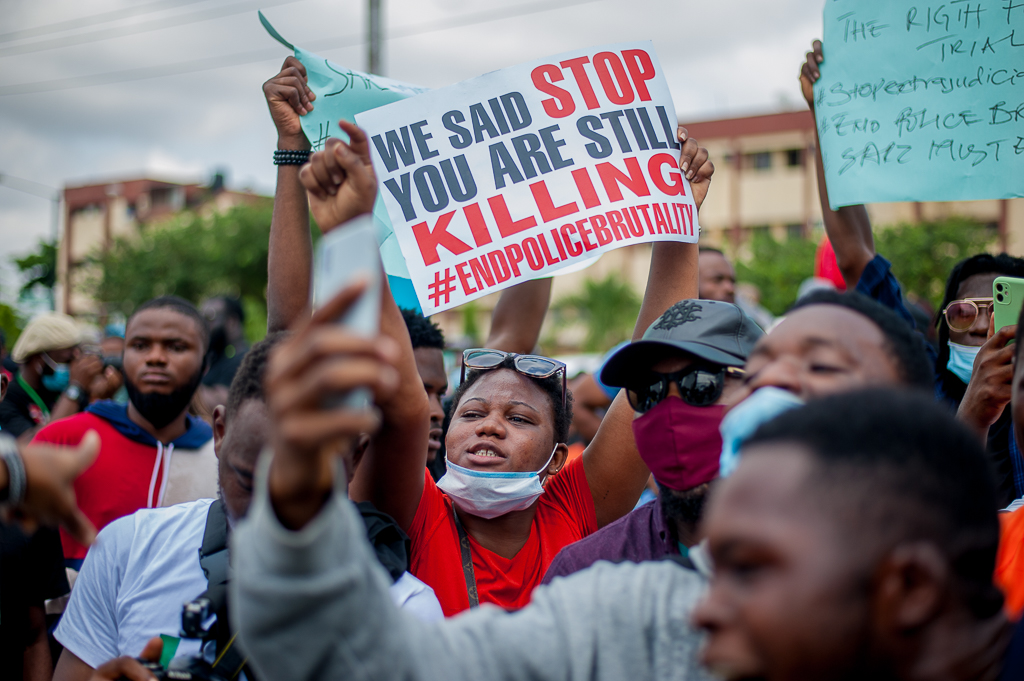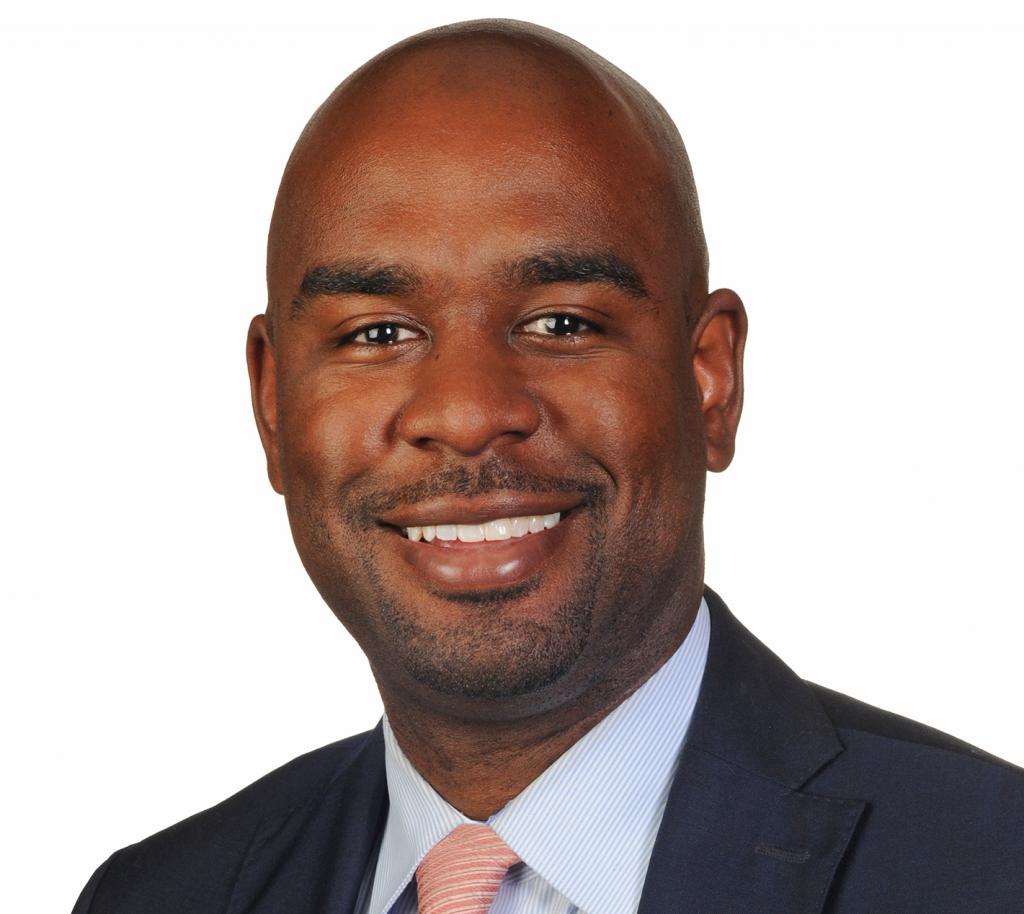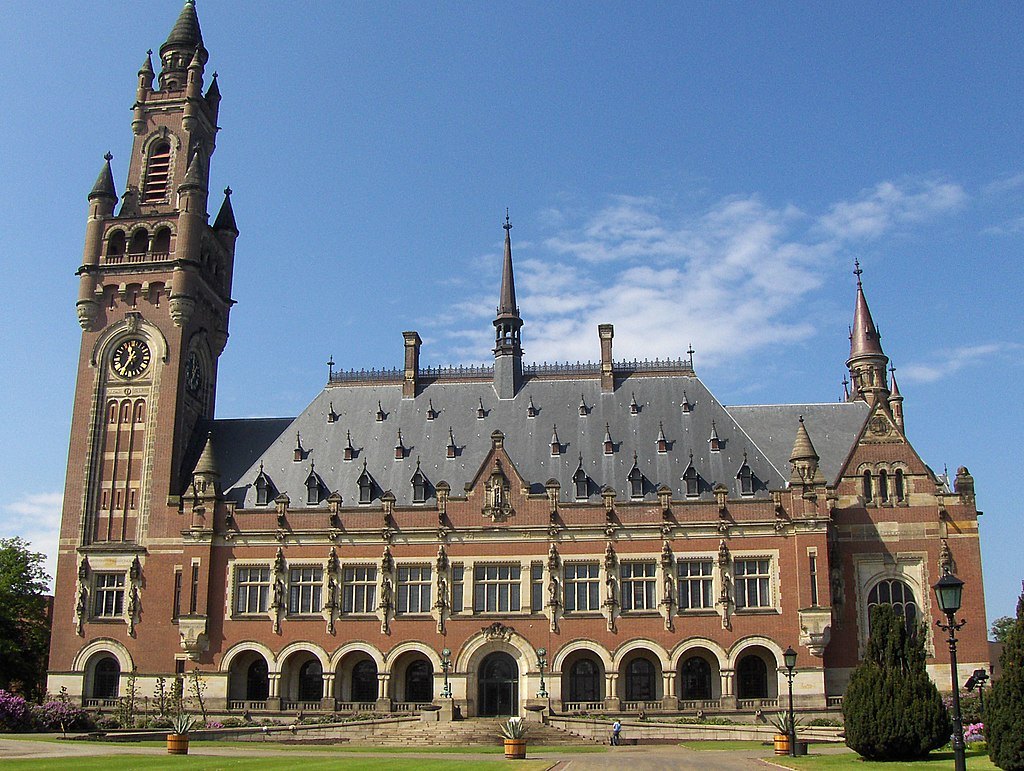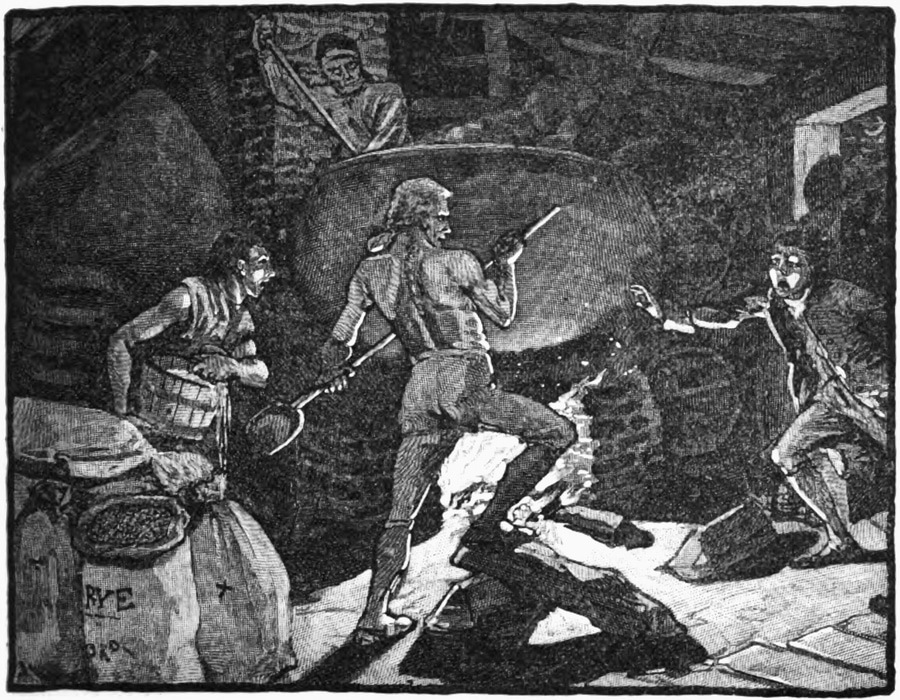Nigeria's #ENDSARS Campaign is About More Than One Police Unit
The protest movement by young Nigerians seems likely to continue for the foreseeable future.

Published by The Lawfare Institute
in Cooperation With

On Oct. 20, thousands of peaceful protesters gathered at the Lekki toll gate in Lagos, Nigeria. Nigerian citizens had been demonstrating for nearly two weeks, advocating for an end to the country’s infamous Special Anti-Robbery Squad (SARS) and broader police reform. But the demonstrators at the toll gate were in violation of a 24-hour curfew imposed by Lagos Governor Babajide Sanwo-Olu—and as soldiers approached, they opened fire, killing at least 38 people. United Nations High Commissioner for Human Rights Michelle Bachelet, said, “Reports that CCTV cameras and lighting were deliberately disabled prior to the shooting are even more disturbing as, if confirmed, they suggest this deplorable attack on peaceful protestors was premeditated, planned and coordinated.” This alleged massacre and its aftermath are just the latest developments in a societal reckoning decades in the making.
Despite smooth transitions of power and democratic rule in Nigeria for the past several decades, the country is on the brink of a major setback. The legacy of military dictatorship of the 1980s and 1990s, the Biafra civil war, rule by northern Nigerian elites, and large economic disparities have created a tinderbox.
For the past several weeks, young Nigerians—using social media and a determination to respond to systemic institutionalized injustices, police brutality and pervasive corruption—have sought to rally an internal coalition to demand change. The social media campaign—centered on the hashtag #ENDSARS—originally sought to mobilize support for abolishing the police unit, whose officers have been accused of extrajudicial killing, robberies and attacks going back several years. But the call for reform has crescendoed into a broader movement throughout the month.
On Oct. 11, the Nigerian police force announced it would dismantle SARS in a seemingly quick response to the mass protests. However, in recent years, the government has made many similar public statements to pacify the public after alleged extrajudicial overreach—and it is improbable that the announcement will halt the protests. Young and internet-savvy Nigerians and members of the Nigerian diaspora around the world, including in Washington, D.C., and London, are coordinating with one another and staging regular protests and sit-ins. This protest effort seems likely to continue for the foreseeable future.
SARS was established in 1992 as a police unit seeking to fight violent crime in Nigeria, including kidnapping and robberies. The unit’s operational style includes a mixture of uniformed police officers and many in plainclothes. The plainclothes officers were known for forcibly demanding cash from civilians, brandishing weapons, and engaging in indiscriminate searches and detentions.
The public quickly began to view the federal police unit as overstepping its mandate. Since 2017, Nigerians have been advocating for the abolition of the unit, pointing to alleged abuse, executions, hangings, beatings, sexual assaults and even waterboarding. Several western and African nongovernmental organizations, including Amnesty International, have documented more than 80 cases of SARS abuses. And there may be many more abuses that have yet to be documented or accounted for.
Groups like Amnesty International have gained insights from people on the ground in Nigeria, who have described SARS as operating with impunity. This is despite numerous attempts to raise this issue at the local and federal levels—including with Nigerian President Muhammadu Buhari himself. Several videos showing alleged crimes by the SARS unit have gone viral. The most disturbing videos, shot on Oct. 4, show SARS officers dragging two limp bodies from a hotel compound into the streets before shooting one of them. In the aftermath of these events, the head of Amnesty International in Nigeria stated, “[H]orrific acts of impunity by SARS and similar tactile police units have continued unabated.”
The present protests have gained international visibility because of a combination of an under-35 population leading the movement and a coordinated effort by various activists to mobilize celebrities, influencers and others to speak up. Past protests—like the campaign to rescue girls kidnapped from Chibok by Boko Haram, which was led by Michelle Obama and other international figures—show that movements in Nigeria on behalf of the vulnerable do work. Notable Nigerians and members of the Nigerian diaspora such as novelist Chimamanda Adiche, actor John Boyega and music sensation Burna Boy have commented on the ongoing movement. Burna Boy argued that “the most important moment in Nigeria’s history … is what we are witnessing right now because if nothing changes after this, if this doesn’t work, then it is over.” Even American and Canadian singers and artists such as Beyoncé, Rihanna, Cardi B and Drake have lent their names and reputations to the cause.
The movement is largely youth led—a reflection of Nigeria’s young and rapidly growing population—and has been spearheaded by peaceful and nonviolent sit-ins and public statements by leading Nigerian intellectuals and artists, both in the country and abroad. In some instances, misinformation campaigns have sought to sow discord and provoke violence—coming on the heels of larger foreign misinformation campaigns and efforts in West Africa. Protesters intent on staying on message have largely ignored such campaigns.
The requests and demands of the movement are informed by a mixed approach due to the various groups involved. The demands include prosecuting the officers involved in abuses, abolishment of the SARS unit and large-scale police reform in Nigeria, among others.
Unfortunately, after several weeks of protest and a moment to unify the country, Buhari missed an opportunity to address the grievances of families and victims of the alleged abuse and violence. In public remarks to the nation, Buhari spoke about the unrest gripping the country, but he failed to directly address the shooting of peaceful protesters at the Lekki toll plaza. “This government will not allow anybody or (any) groups to disrupt the peace of the nation,” he warned in his televised address, urging protesters to “resist the temptation of being used by some subversive elements to cause chaos with the aim of truncating our nascent democracy."
“For you to do otherwise will amount to undermining national security and law and order,” he went on. “Under no circumstances would this be tolerated.” And he responded to criticism from international actors as well as from his fellow African leaders, calling on all of them “to seek to know all the facts available before taking a position, or rushing to judgment and making hasty pronouncements.
For analysts in Nigeria and the broader West African region, Buhari’s tone and delivery was reminiscent of the ghosts of military leaders of a bygone era, including himself when he served. His silence on the Lekki toll gate massacre was even more glaring. For many, including the younger generation, the president seems out of touch with the present moment.
For Nigerians and Africans, the police brutality inside Nigeria’s borders follows a summer of reckoning with police brutality and abuse touched off in the United States after the death of George Floyd. This moment also ushered in a worldwide social media campaign and global protests in solidarity with the Black Lives Matter movement—particularly for continental Africans, many of whom voiced feelings of a pan-diasporan and pan-African solidarity on issues of police abuse. Within Africa, this movement turned the spotlight onto African leaders across the continent’s 54 nations. Nigeria is no exception, as it too suffers from problems with police reform, abuse of citizens, and distrust between civilians and law enforcement.
At the international level, U.N. Secretary-General António Guterres issued a statement denouncing the attacks on innocent civilians. According to the U.N., Guterres “encourages the authorities to swiftly explore avenues to de-escalate the situation” and “reiterates the readiness of the United Nations to support national efforts toward finding a solution.”
Furthermore, on Oct. 22, U.S. Department of State spokesperson Morgan Orgaus relayed that, as part of an already-scheduled meeting between U.S. diplomats and Nigerian Vice President Yemi Osinbajo, the diplomats raised their concerns about the ongoing violence and widespread protest and “expressed U.S. condemnation of the use of excessive force by military forces who fired on unarmed demonstrators in Lagos.” President-elect Joe Biden has also spoken up publicly about the #ENDSARS campaign, saying, “The United States must stand with Nigerians who are peacefully demonstrating for police reform and seeking an end to corruption in their democracy.” Biden’s comments seem to be addressed both to Nigerian citizens and to members of the Nigerian diaspora in the United States.
Nigerians and President Buhari are not alone in the difficult task of restoring order and transparency, and instituting internal reviews and mechanisms for police reform. International pressure and regional bodies are pushing for Buhari to take seriously regional and international mandates to protect citizens and society. For example, the International Bill of Human Rights, the African Charter on Human and Peoples’ Rights, and the Constitution of the Federal Republic of Nigeria 1999 (as amended) all offer binding principles to uphold in order to protect Nigerians citizens. Solutions are neither easy nor swift, but with consultation and collaboration with those affected, problems can be solved. The jury is still out on the direction in which Buhari is going—but at a minimum his administration is taking these concerns seriously.
With other countries, including the United States, struggling to reform law enforcement, Nigerians aren’t alone on their journey to find the right solutions to the problem of police abuses. For Nigerians and citizens who are publicly advocating for change, only time will tell which direction this will go. But, with consultation, and meaningful dialogue and change, there is a window for moving Nigeria, the region and Africa in the right direction.





